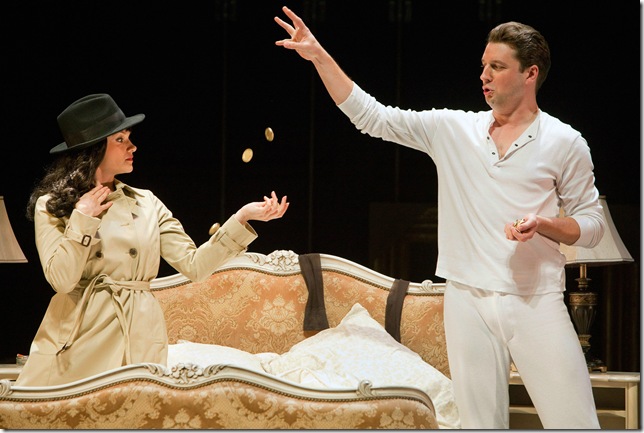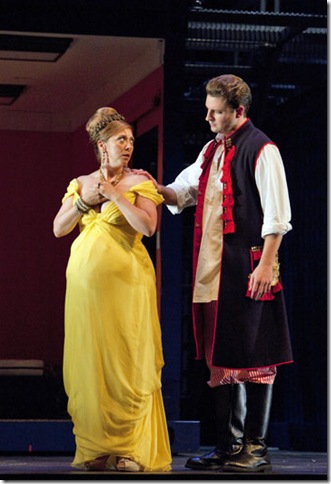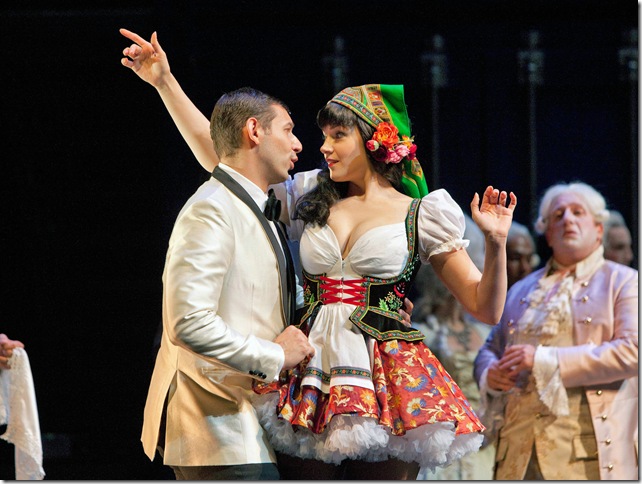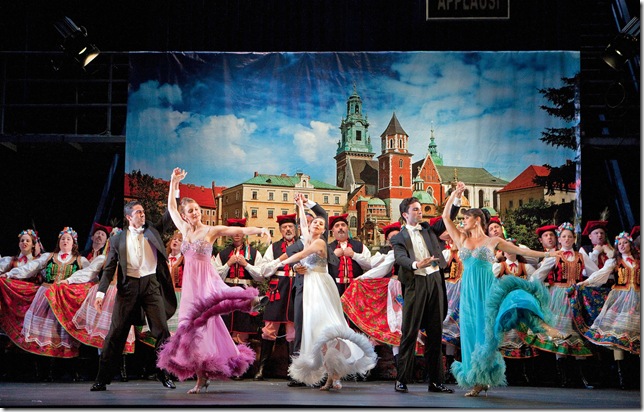ANNANDALE-ON-HUDSON, N.Y. — “This is a royal mess,’’ sings one of the characters in Bard Summerscape’s performance of Emmanuel Chabrier’s comic opera Le Roi Malgré Lui (The King In Spite of Himself).
This could well be a wry reflection on the quality of the singing or the production. It is not. Standards were very high. Rather, it goes to the root of why this opera is not done today: the confusing and complicated plot.
Chabrier packs chorus after chorus on stage, in trying to spice things up, a device used in Broadway shows when things aren’t going well. And Thaddeus Strassberger, the director, introduces countless gimmicks to keep audiences riveted: A tanning bed, a man watching TV, great scenic backdrops that constantly change, people on roller skates, huge boxes that open to show 18th-century characters playing cards, TV cameras filming the opera, and so on and so on.
It’s as if, with his brilliant imagination, he’s gotten so involved in distracting us that he’s unwittingly enhanced the weakness of this miserable plot.
All that said, it was a brave and worthy effort. And Chabrier’s lovely music, especially the very familiar opening bars of Act II, carry the day, especially with the American Symphony Orchestra in the pit sounding robust and simply damn good. Their playing anchored this mish-mash of an opera and made this unjustly neglected score worth another hearing.
Just as Russian plays have wonderful translations and rewrites, it is perhaps time for operas of this high musical caliber to have their libretti, and plots, rewritten. Purists will decry this as sacrilege.
But how else can neglected works be revived? Gimmicks only go so far. It it is the plots and librettos that must be rewritten to match the lovely music. Times change, and sensibilities, too. What was amusing in 1886, involving a royal Valois, elected by popular vote to be king of Poland, and his reluctance to take the throne, is no longer comic material.
Leon Botstein, president of Bard College, a few miles from New York City, is the power behind Bard Summerscape, which he founded in 1989. He also conducted this performance. The American Symphony Orchestra is his creation. Money seems to be no object; this was a lavish and well-dressed production. Chorus master James Bagwell delivered big time with some of the best staged choral singing I’ve heard, even from the Met.
Liam Bonner as Henri, the reluctant king, has a warm lyrical baritone; Michele Angelini’s flourishing strong tenor voice was perfection as Count Nangis. Andriana Chuchman’s soprano soared into the high heavens with grace and ease in the role of Minka, while Nathalie Paulin sang Alexina with a honey-toned voice that’s up there with all the great sopranos; hers is an incredibly beautiful instrument.
On Sunday, Aug. 19, Botstein will lead an all-too-rare concert performance of Saint-Saens’ grand opera Henry VIII, composed in 1883. Saint-Saens’ best-known stage work is Samson et Dalila, which is continually produced because its music is lovely and it gives mezzo-sopranos a chance to shine in the leading part.
But how many of these choices go on to have appeal to the opera-going public and a new life? His missionary zeal is well appreciated by the critics, but connoisseurs of opera are few and far between. Look at how many American opera companies have closed in the last few years, no thanks to the Met’s HDTV broadcasts and the lousy economy, which has squelched donations.
Nevertheless, the New Yorker recently said “connoisseurs will descend en masse’’ to hear Le Roi Malgré Lui, and they were right. Full houses were the norm for the five performances at Summerscape. Botstein has tapped into an audience of the cognoscenti who are intrigued by his choices.
Editor’s note: ArtsPaper opera critic Rex Hearn is up north for the summer.



